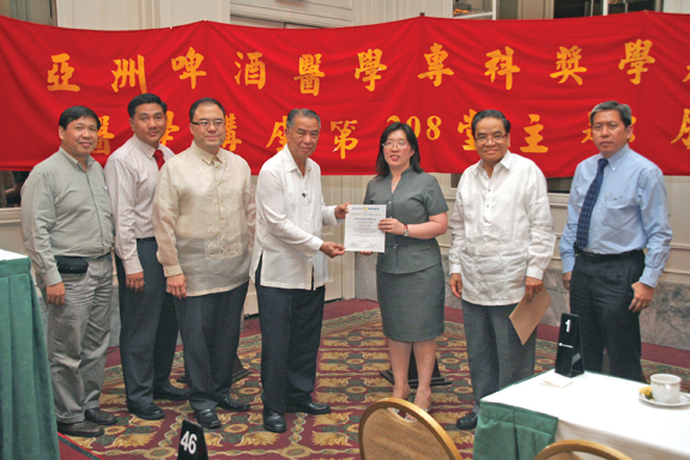| Medical Forum No. 205 Common Ocular Concerns Discussant: Joyce Yao, M.D. The eyes are a highly sensitive system in themselves that present numerous signs and symptoms once injury sets in. Some of these include: Migraine, which can be symptomatic of a vision-threatening problem has symptoms that include visual disturbances such as flashing lights, photophobia, blurred vision, and visual field defect lasting from 15 to 50 minutes. Hormonal changes, food containing tyramine or phenylalanine, nitrates/nitrites, monosodium glutamate, alcohol, fatigue, emotional stress, and bright lights are common precipitating conditions for migraine attacks. Treatments includes avoidance of precipitating agents, correction of eye refraction, and medications such as oral medicines. Pterygnium is a degenerative eye condition resulting from damage due to chronic ultraviolet exposure or chronic irritation from wind and dust. Slit-lamp examination is required to identify the lesion and evaluate corneal thickness. Treatment includes: use of eyewear and lubrication to reduce ocular irritation; if inflamed, use of artificial tears, mild topical steroid, and a topical non-steroidal santi-inflammatory medication; surgical removal if the pterygium progresses toward the visual axis and irritation is excessive or interfering with contact lens use. Dry eyes (Keratoconjunctivities Sicca) is a condition in which the precorneal tear film is deficient and cannot do its normal function of lubricating the anterior surface of the cornea. The condition is most frequently seen in postmenopausal women due to varying estrogen levels. Other causes include connective tissue diseases, conjuctival scarring, drugs, infiltration of lacrimal glands, post radiation fibrosis of lacrimal glands, vitamin A deficiency, post PRK and LASIK procedure. Symptoms vary from irritation, foreign body sensation, sandy sensation to sensitivity to light and most commonly felt in the afternoon or evening. Treatment includes artificial tears, lubricating ointment or gel, occlusion, or in severe cases patch or moist chamber and lateral tarsorraphy may be done. Medical Forum No. 206 Anemia Discussant: Juanita Lu Lim, M.D. Anemia is the lack of red blood cells in circulation—when hemoglobin level is below 140 g/l in males and 120 g/l in females. Major causes of anemia are related to problems in the production, maturation, and increased destruction of red blood cells. Blood loss is also a major cause of the condition. Manifestations or symptoms vary, depending on the severity speed of development of the illness. These include pallor, easy fatigue, difficulty of breathing, lack of concentration, insomnia, excessive sweating, rapid heart rate. Several tests are available to confirm cases of anemia. Among these are basic tests such as complete blood count, reticulocyte count, examination of peripheral blood smear, blood chemistry. Other tests depend on possible causes and may include serum ferritin, bone marrow examination, gastrointestinal endoscopic studies, among others. Course of treatment depends on the cause of anemia. If blood count is very low and patient is too weak because of anemia, blood transfusion may be necessary before treating the cause. Medical Forum No. 207 Asthma Discussant: Dennis Teo, M.D. Asthma is not a specific disease but a syndrome that derives from multiple precipitating mechanisms, that cause airway inflammation and airway hyper responsiveness. Asthma typically occurs in younger individuals and non-smokers and is characterized by coughing which gets worse at night, wheezing, difficulty of breathing, and chest tightness. Various triggers are associated with asthma. Among the most significant are house dust mite and cockroaches. Other triggers are pollen, viruses, some food and drug allergens (aspirin, betablockers), cats’ and dogs’ saliva, air pollution, smoking, and chemicals. Among certain patients, nasal allergies and allergic conjunctivitis are also triggers. There is no cure for asthma; only control measures. Some patients may outgrow asthma. Different medications target specific pathways to gain control. Controllers, which include inhaled steroids and oral or intravenous steroids slow down airway inflammation and prevent remodeling and asthmas attacks. Relievers can almost instantly improve symptoms during an attack, but do not address the inflammation mechanism of asthma. Other treatments include immunotherapy to sensitize patients with specific allergen triggers. Medical Forum No. 208 Cholesterol and Its Bad Effects Discussant: Francis Marie Purino, M. D. Cholesterol is a structural component of the cell membrane and is an important component of bile acids, vitamins, and other fat soluble vitamins. There are three types of cholesterol: low density lipoproteins (LDL), which makes up 60-70% of the total serum cholesterol and is the primary target of cholesterol-lowering therapy; high density lipoproteins (HDL), which acts as cholesterol scavengers picking up excess cholesterol in the blood, and is therefore good cholesterol; very low density lipoproteins (VLDL). Factors of diet, weight, and physical activity affect cholesterol levels. Sources of good cholesterol are fibers such as oat bran, legumes, soy, peas, broccoli, fruits and vegetables; plant oils such olive, canola, flaxseed, sunflower; and omega 3 FAs such as plants oils, tuna, salmon, sardines. High levels of blood cholesterol cause heart disease, stroke, and metabolic syndrome. Treatment should include losing weight, exercising, addressing hypertension and hypercholesterolmia, and cessation of smoking. Medical Forum No. 209 Poisons Inside the Household Discussant: Paz Dioquino, M. D. Common households poisons are ordinary items in the home that may cause serious health hazards if not handled and used properly. These are solvents, cleaning agents, alkali such as liquid sosa or sodium hydroxide, acids (muriatic, toilet bowl cleaners, car battery fluid) pharmaceutical agents, pesticides, elemental mercury, and methamphetamine. It is important to observe safety precautions by: identifying and removing substances that can cause poisoning; ensuring that poisonous substances cannot be reached by children; storing poisonous substances away from drinking or eating vessels; teaching children to recognize things or substances that are not to be played with or eaten; and supervising children at all times. In case of poisoning, the following should be done:
Medical Forum No. 210 Treatments for Localized Prostate Cancer Discussant: Aldrin R. Gamboa, M.D. The prostate is a gland in the male reproductive system. It produces fluid that forms part of the semen that carries sperm, and is located beneath the bladder and surrounds the upper part of the urethra. Prostate cancer does not follow a normal pattern and can grow uncontrollably by spreading to other tissues. It is typically a very slow-growing tumor, often with no symptoms until its advanced stages. Risks factors for development of prostate cancer are age, diet, genetics/family history. Tests to determine the disease are Digital Rectal Examination(DRE) and blood test of Prostate Specific Antigen (PSA). Treatment options for localized prostate cancer include active surveillance, radiation therapy, radical prostatectomy, open technique, and minimally invasive surgery such as laparoscopic and robotic proatatectomy. |
|
Comments are closed.
|
Asia Brewery Monthly Medical Forum
Keeping updated with the latest knowledge in the medical and healthcare fields, Asia Brewery, Inc. Monthly Medical Forum provides the much-needed venue for lay people to understand and use knowledge towards better health. Archives
March 2019
Categories |



 RSS Feed
RSS Feed